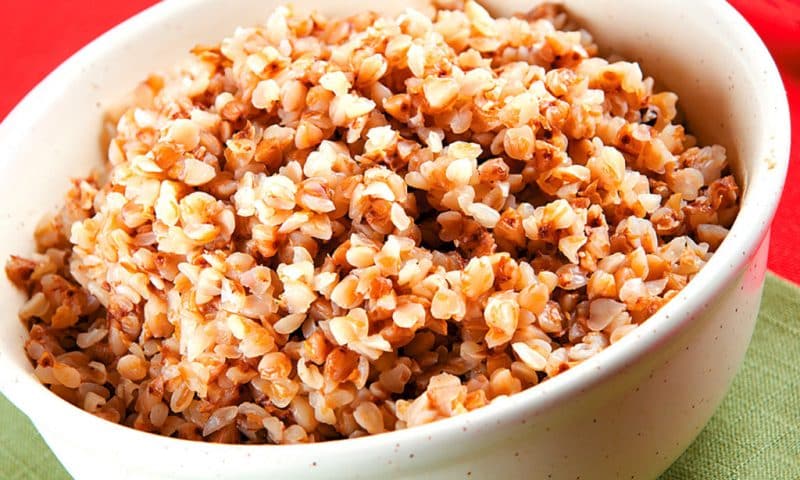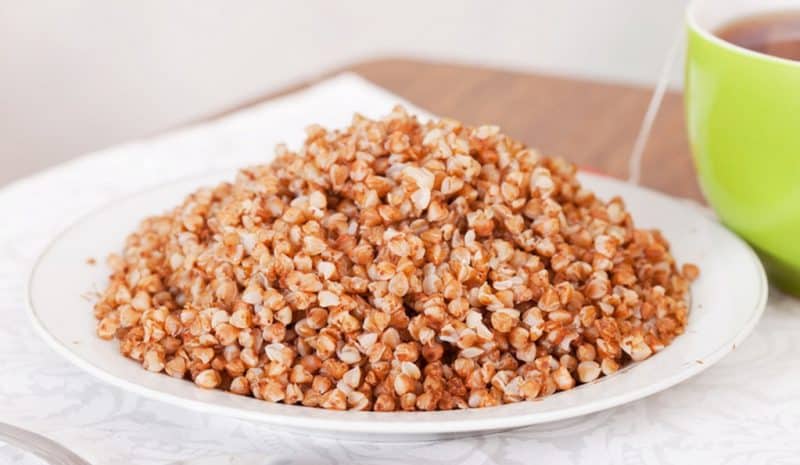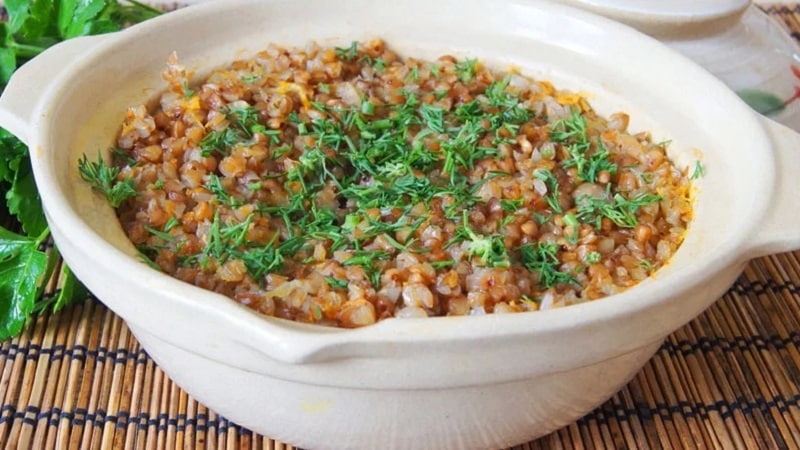What is the calorie content of boiled buckwheat and is it possible to lose weight?
Nutritionists praise buckwheat and recommend including it in your diet. If you decide to lead a healthy lifestyle and want to start with proper nutrition, this article will help you figure out how many calories are in buckwheat and whether it helps you lose weight.
Calorie content of boiled buckwheat
The calorie content of buckwheat depends on the cooking method and added ingredients.. Buckwheat, which is cooked in water, has an energy value of about 90 kcal. If you add salt during cooking, add another 15 kcal.
After adding a spoonful of vegetable oil, the calorie content will be 150 kcal, and a spoonful of butter – 180 kcal. These figures are calculated per 100 g of boiled cereal. A serving of boiled buckwheat per person is about 50 g, respectively, one serving of boiled buckwheat with water contains only about 45 kcal.
Note. If you cook porridge with milk, the calorie content will be 120-160 kcal, depending on the fat content of the milk.
In dry form, the calorie content of buckwheat is 305 kcal.. Buckwheat has the lowest calorie content among other cereals: the energy value of rice is about 340 kcal, millet - 335 kcal, corn grits - 325 kcal.

Another way to cook buckwheat – steaming. Steamed buckwheat has a low calorie content. Many nutritionists believe that cereals prepared in this way are even healthier than boiled ones. There are 105 kcal per 100 g of dish, and 52.5 in one serving of steamed cereal.
Is it possible to eat boiled buckwheat if you are losing weight?
Can. This The product helps maintain a feeling of fullness for a long time and fills the body useful vitamins and microelements.
Tips for losing weight how best to cook this grain to achieve ideal results:
- For diet Boiled or steamed cereal is ideal. It is better to cook porridge in water.
- If you can’t live without milk, cook the porridge with skim milk. The calorie content will be higher, but this porridge is suitable for breakfast and will keep you full for half a day.
- Don't add other ingredients – butter, sugar, seasonings increase calorie content. As an exception, it is permissible to add a little olive oil.
- If you're tired of porridge, try buckwheat pancakes for a change. To prepare them you will need cereal, water, eggs, yeast and a little flour. This is a great option for breakfast.
If you want to lose weight with buckwheat, arrange once a week fasting day on buckwheat. Prepare enough cereal for the whole day and consume it throughout the day, excluding other foods. You will feel light, and on the scale you will see minus 1 kg - this is excess fluid that will leave the body.
The benefits and harms of buckwheat
The benefits of boiled and steamed buckwheat:
- strengthens the walls of blood vessels and has a beneficial effect on the functioning of the entire cardiovascular system;
- helps fight chronic fatigue and stress thanks to the vitamins it contains;
- increases immunity;
- helps cope with diseases of the gastrointestinal tract;
- normalizes blood sugar levels, which means it is required in the diet of people suffering from diabetes;
- non-allergenic, therefore it is recommended to introduce it into the diet of young children (from 6 months);
- with regular use, it is able to remove toxins and waste from the body;
- removes water and regulates metabolism;
- improves sleep and mood;
- has a beneficial effect on the condition of the skin, hair and nails.

However, buckwheat can be harmful to health. For example, when exclusively consumed as a mono-diet. Despite all the benefits of this cereal, you should not eat it alone. You can lose weight on a mono-diet, but only by causing great harm to your body due to the lack of many vital elements in the diet.
Composition, calorie content and nutritional value of buckwheat
100 g boiled buckwheat: proteins – 4.2 g, carbohydrates – 21 g, fats – 1.1 g. Dry buckwheat has different indicators: proteins – 12.5 g, carbohydrates – 64 g, fats – 3.3 g.
Vitamins in buckwheat:
- B vitamins support the functioning of the central nervous system, help relieve stress and depression;
- vitamin A reduces the risk of diseases of the organs of vision, promotes tissue regeneration and strengthens bones, has a positive effect on the health of nails, hair and skin;
- tocopherol (vitamin E) improves immunity, takes part in the synthesis of elastin and collagen, and increases the supply of oxygen to cells.
Main minerals in the product:
- manganese;
- magnesium;
- phosphorus;
- copper;
- zinc;
- iron;
- potassium;
- calcium.

Buckwheat consumption standards
The portion of buckwheat is regulated at your discretion, but for an adult, 50-60 g of the finished product is enough to satiate.
Advice. If you are watching your weight, do not eat buckwheat in the evening - it contains a lot of carbohydrates. In the evening, it is better to eat some vegetables and lean poultry or fish.
Conclusion
Buckwheat is an environmentally friendly product.No chemicals are used during its cultivation, so you don’t have to worry about the fact that it contains harmful substances.
If you want to improve your health and appearance, include this grain in your diet. Fragrant porridges, buckwheat pancakes and pancakes are both tasty and healthy.